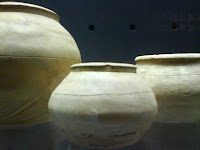
I may have mentioned that before. It doesn't matter if those old pots are used up, smashed, or scarred. Whether they are complete, entire, or come with legs and lugs.

I have a special, foolish fondness, for ancient, dug-out-the-ground, the older-the-better pots. Watching those, I can ooh and ahhh and lose track of just how many grandmothers can you count? Stirring those cauldrons? Track them back, in their thousands, passing this way since their time to mine.

Then I fancy that old pots talk to me; primeval speak. They whisper sustaining food and spiced warm drink; they ring with echoes of people and ways of life and death. I'd like to lay my hands on those pots. We're just the same. We eat, we love, no different. We can turn love to hate. We can withhold; lose nourishment. Or give away too much, leaving everything scoured out and empty.

Maybe old pots remind me of all people everywhere. All shapes and sizes. Chipped and scarred, busted and cracked. With lips, necks, feet. They are bellies. They are lungs, filled up. They are wombs, heavy, empty. They are breasts, bums, bladders. They pose. Sad, dumpty, funny, composed, don't touch me, touch me lots.

It's not surprising then, with my love of the 'umble clay pot, that I have a rejoicing time of it, down at Hong Kong's Heritage Discovery Centre.
And what a heritage. China, in its neolithic period, was knocking out cooking pots with fine patterns and functional necks. I'm told that's about six thousand years ago. Glazing followed shortly afterwards, in China's bronze age, and from that point no-one stopped them growing from pottery strength to complete ceramic mastery. Except Mao.
Well, here, in Hong Kong, they have the neolithic Tung Wan Tsai archaeological site, explained and presented at the Discovery Centre, to help me communicate my passions to the kids about bone ornaments, stone rings, and pottery cauldrons.

And the site at Penny's Bay, Lantau Island, where they found mountains of discarded blue glaze Ming dynasty porcelain; dumped, possibly, as damaged goods on the way from the kilns in Guangzhou to the markets in Southeast Asia. Beautifully presented.


For once, China gets everything right. I am blissed out on old pots, from six thousand years ago, to last century, in an atmosphere which allows for devotional study, calm contemplation, and rich imagining.

Perfect. Except for one thing.
They called it a Discovery Centre.
Maybe I had a bad experience somewhere, but if you say to me Discovery Centre, I conjure up a dark, dank place with all the style and charm of a disused underpass.
There might be some hastily-erected panels, which wobble threatening at the fearful sounds of hammering and concrete churning. I pass the entire time fretting about asbestos, and trying not to breathe. If the Discovery Centre is going all out for the child vote, there may be knobs to bash and buttons to thump. These will be broken, along with the computer games. It is just as well. They will be bewilderingly pointless, with no merit, educational or otherwise. They will soon have me wishing, that in the near pitch-black dark, I could have the type of leg injury which would require air lifting to hospital. That would be salvation.
So if they had called this place not Discovery Centre, but Archeology Museum, or even Old Crocks and Pots Museum, I would have been here one year ago, like a shot.
As it was, I missed it for an entire twelve months, and I'm kicking myself.





3 comments:
Those pots are amazing.
Discovery Center to me conjures up images of broken old crayons and a crap worksheet printed off for kids to color and take home to convince their parents they learned something at the museum today. Blech.
You're right, they majorly screwed up and should have called it 'The Archaeological Museum.' That would have given it the serious name it deserved. I wonder how many tourists skip this pace because of the name?
Lovely pots Grit. China has so much history to swoon over. Just a shame that most, if not all, of its various leaders over the centuries have had such little regard for the bulk of its people.
Post a Comment